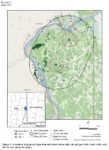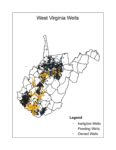 |
|
|||||||||
|
After yesterday’s public hearing on the “co-tenancy” bill (HB 4268), the House Judiciary Committee took up and passed an improved version of the bill that, most importantly, addresses the problems we raised regarding surface use and the need to require surface owner’s consent. If version of HB 4268 that came out of the House Judiciary Committee passes, if the driller uses the statute to get the right to drill into the mineral tract beneath a surface owners’ land or into any neighboring mineral tract, the driller will have to get the agreement of the surface owner to locate the well pad on their surface, regardless of whether the surface owner owns an interest in the minerals. Requiring the surface owners consent is very important, and a significant improvement that makes it worth supporting the bill. Why? Let’s start with the legal background. Current law says that the mineral owner/driller has the right to make “reasonably necessary use” of the surface if that use was in “in the contemplation of the parties” at the time of the severance (or at the time of the lease IF the lease was before the severance) in order to get his minerals out (otherwise the minerals are useless – at least until horizontal drilling). But does the driller have the right to the use the surface to drill horizontal wells bores into neighboring mineral tracts that were not part of the surface at the time of severance? We say no. The drillers say yes. They say that the only economical way to drill and produce the Marcellus under a surface owner’s land is to drill horizontals that extend into neighboring mineral tracts, so it is a “reasonably necessary use” of the surface to do so. And they say that the “contemplation of the parties” only applies for radical new surface uses like strip mining vs. shaft mining, not horizontal drilling. We say the drillers are wrong because there is no need at all to use our surface if they can develop the mineral tract under our surface from 1-2 miles away. And we say that the horizontal drilling is like cases that ruled our way for surface owners on the contemplation theory. That question of who is right, us or the drillers, will soon be decided by the West Virginia Supreme Court on the appeal of a case where a Doddridge County Circuit Court judge agreed with WV-SORO that a driller cannot use a surface owner’s land to drill wells horizontally into neighboring mineral tracts without the surface owner’s consent. We are worried that the Supreme Court might decide for the drillers. However, if the version of HB 4268 that came out of House Judiciary passes, then if driller uses the statute to get the right to drill into the mineral tract under a surface owners land, or any neighboring mineral tract, the driller will have to get the agreement of the owner of the surface to locate the well pad on their surface. Many, if not most, of the wells they drill will use the statute. So if it passes in its current form, in most cases the surface owner’s consent will be needed even if the Supreme Court decides against surface owners. We believe this requirement is an important enough, that it is worth supporting the bill. This inclusion of these provisions is key to our support. It’s unclear if these provisions will stay in the bill as it works it’s way through the process, and we will only support it if the Senate agrees to leave these surface owner protections in. House Judiciary Chair, Delegate John Shott (R-Mercer) deserves special thanks for listening to our concerns and making sure these provisions were included in the bill. In addition to surface owner’s consent, the bill provides that if missing and unknown mineral owners do not show up after seven years, the millions of dollars that would go to them during that time will be used to plug some of the 4,000 orphaned wells out there that need plugged. After that, the surface owner can go to court and get title to whatever share of the minerals the missing or unknown person had, and get future royalties. This reunification of surface and minerals is also a good thing. The version of the bill that passed the House Judiciary Committee, also strengthened the protections for the non-consenting mineral owners. We need to take a closer look at these provisions, but some of these protections include royalties paid being based on no deductions, and no storage/injection/arbitration/or venue clauses. For our members who are mineral owners we would have preferred a due process hearing before the Oil and Gas Commission, so that they can get better terms rather than be stuck with what their cousins got talked into by the drillers, but balancing what the bill does for surface owners, we can live with what is in the bill for mineral owners. The Legislature believes that the 75% of owners who want development and royalties etc. should be able to do so and it is unfair for the minority co-tenants to block all the others from the benefits of their land ownership. We believe the Legislature will pass some bill to that effect, and for that reason and the reasons outlined above we worked to improve the bill to get better protections for surface owners, but we support it if and only if these provisions stay in. We hope this clarifies our position on the bill. Please reply to this post if you have questions or concerns. We appreciate your support and value the trust you put in us to represent your interests at the Capitol! We’ll continue to keep you posted. |
||||||||||
WV Surface Owners' Rights Organization © 2016
Frontier Theme








